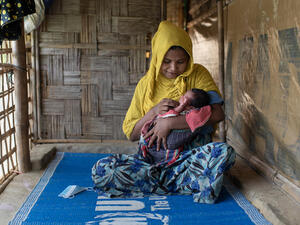UNHCR Concerned About Life-Threatening Boat Journeys For Asylum-Seekers Finding Safety
UNHCR Concerned About Life-Threatening Boat Journeys For Asylum-Seekers Finding Safety
Kuala Lumpur, 12 December 2014 - UNHCR has expressed concern about the dangers of irregular boat movements in the Bay of Bengal which involve potential asylum-seekers and refugees. This comes as an international forum on protection at sea concluded in Geneva on Thursday.
The outflow of people from the Bay of Bengal is not new, but numbers have been rising steadily. Departures tend to peak after the rainy season. Between October and November this year, some 21,000 Rohingya and Bangladeshis set sail to Southeast Asia, mainly to Thailand and Malaysia. This figure is a 37 per cent higher than over the same period last year.
About 10 per cent of this year’s departures were women. One out of every three arrivals interviewed by UNHCR in Thailand and Malaysia was a minor under 18 years of age. Children as young as eight years old have travelled on their own. Many are subject to exploitation in the hands of smugglers and human traffickers.
“We are shocked by the accounts of violence that people suffer at the hands of smugglers and traffickers. Survivors describe armed crews beating and starving them of food and water on the overcrowded boats and in smugglers’ camps in Thailand. Hundreds of people have died as a result,” said Richard Towle, UNHCR Representative in Malaysia.
Many of those who arrive in Malaysia are in an extremely poor physical state. This year alone, nearly 200 Rohingya arrivals in Malaysia have been diagnosed with beri beri. This form of Vitamin B1 deficiency is caused by poor diet and likely exacerbated by long-term confinement in smugglers’ camps. Many of them cannot walk and have to undergo months of rehabilitation before they can get back on their feet.
“The problem transcends national boundaries and can only be addressed through the concerted common action between States, supported by UNHCR and others,” said Towle.
UNHCR is also concerned that boat arrivals are systematically arrested and detained in some States – sometimes indefinitely. People seeking asylum are not committing a criminal act, and indefinite and mandatory forms of detention are prohibited under international law.
“Detention is known to have negative and often serious physical and psychological consequences for refugees and asylum-seekers who are already traumatized by the conditions they fled and the abuse they suffered en route,” said Towle.








